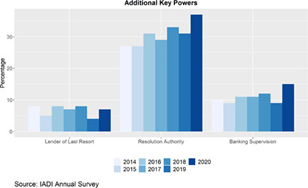Are uninsured deposits different from insured deposits?
The insured depositor is an individual whose deposit is insured at a insured institution. Insured institution are credit institutions, foreign bank branches that are entitled to receive deposits from individuals, including commercial banks, cooperative banks, people's credit funds, foreign bank branches established and operating under the provisions of the Law on Credit Institutions; microfinance institutions must participate in deposit insurance for deposits of individuals, including voluntary deposits of microfinance customers, except for compulsory savings deposits according to regulations of microfinance institutions, Vietnam Bank for Social Policies are not required to participate in deposit insurance.
Depositors do not have to pay any extra money to have benefit from the deposit insurance policy. This is a regulation of the State to protect the interests of savings depositors. The aforementioned banks and financial institutions will be responsible for purchasing deposit insurance for their customers.
According to Circular No.48/TT-NHNN dated December 31, 2018, it is stipulated that savings is the amount deposited at a credit institution by the depositor on the principle of being fully refunded the principal and interest as agreed upon agreement with the credit institution. However, the same deposit has an insured deposit and an uninsured deposit.
Article No.18 of the Law on Deposit Insurance stipulates that “insured deposits are deposits in Vietnamese Dong of individuals with insured institutions in the forms of time deposits, demand deposits, savings accounts, certificates of deposit, bills, notes and other types of deposits as stipulated in the Law on credit institutions, except the deposits stipulated in Article 19 of this Law.” Thus, insured deposits are deposits in Vietnam dong of individuals deposited with insured institutions in the form of term deposits, demand deposits, savings, certificates of deposit, etc. promissory notes, bills and other forms of deposit in accordance with the Law on Credit Institutions.
Like other bank deposit products, funds on certificates of deposit are also insured. Compared with savings, certificates of deposit usually have higher and more stable interest rates, depending on the long or medium term. Certificates of deposit with longer maturities; for example 6 months, 9 months, 12 months, 18 months, 24 months, 36 months or 84 months... depending on the bank and the issuance period. In theory, customers who buy certificates of deposit cannot withdraw before maturity, if any, they also have to wait after half the term (depending on the bank), so the liquidity will be less than the form of savings.
In addition, promissory notes and bills of exchange are also insured. According to Article 5 of Circular No.01/2020/TT-NHNN, promissory notes are proof of debt repayment obligations of credit institutions, foreign bank branches issued to buyers of valuable papers within a certain period of time, interest payment and other conditions. Currently, Vietnamese law does not have specific regulations on what bills are. But it can be understood that a bill is a valuable paper and a debt certificate issued by the State Bank of Vietnam or the Government. In particular, there are two popular types of bills: bank bills and treasury bills.
For online savings, as a rule, online savings (or online savings) is a form of savings where customer deposit or withdraw their savings via the internet without having to go directly to the delivery point. translation of credit institutions. Deposits in Vietnamese dong at deposit insurers that accept deposits from individuals are all insured, including online savings, except for deposits of uninsured entities according to regulations. under the law. When an insurance payment obligation arises, online savings depositors prove their legal ownership of the deposit to be protected in accordance with the law.
As for uninsured deposits, according to Article 19 of the Law on Deposit Insurance; Clause 2, Article 4 of Decree No.68/2013/ND-CP dated June 28, 2013 detailing and guiding the issuance of the Law on Deposit Insurance: Deposits of individuals at credit institutions who own more than 5% of the charter capital of the same credit institution; deposits of individuals at credit institutions who are members of the Members' Council, members of the Board of Directors, members of the Supervisory Board, the General Director, Deputy General Director of the same credit institution; deposits at foreign bank branches of individuals who are General Director Deputy General Director of the foreign bank branch; Money to buy anonymous valuable papers issued by the deposit insurer are not insured.
In addition, deposits not in Vietnamese dong, compulsory savings as prescribed by microfinance institutions, and deposits not belonging to individuals are not insured.
So why are the deposits of members of the management board and major shareholders of the participating institutions not insured? The purpose of this policy is to enhance the responsibility in management and administration of members of the Board of Directors, Supervisory Board, General Director, Deputy General Director in activities of credit institutions and limit moral hazard, therefore, deposits of the above subjects are not insured.
Need to improve depositors' knowledge about deposit insurance
The deposit insurer is a financial institution assigned to implement public policy on deposit insurance. In Vietnam at present, there is only one deposit insurance organization- Deposit Insurance of Vietnam - a state financial institution, operating for non-profit purpose, implementing the deposit insurance policy, contributing to maintaining the stability of the credit institutions system, ensuring the safe and healthy development of banking activities.
Over the past time, associated with the process of restructuring the system of credit institutions, DIV has gradually promoted its role, most clearly showing that this organization has fully and promptly paid thousands of depositors at collapsed people's credit funds; prevent the scope of these funds from adversely affecting the healthy operating system of people's credit funds.
In addition, the Law on Credit Institutions 2017 has given DIV greater responsibility to participate more deeply in the restructuring process of credit institutions. However, due to many objective reasons, the role of DIV can only be shown to a certain range. Specifically, many depositors do not really care and have the right awareness of the deposit insurance policy, because they think that if there is a failure of a credit institution, the State has to handle it. But when the economy transforms into a more authentic market economy, the deposit insurer will promote its role and function in accordance with the provisions of the Law on Deposit Insurance.
People really need to learn about the deposit insurance policy, because once they understand and have knowledge about this field, knowing the important role of this policy will benefit not only the depositors themselves, but also beneficial to state management agencies as well as credit institutions.
A full and accurate understanding of deposit insurance policies will help people be responsible when choosing and depositing money at insured institutions, limiting the situation that some credit institutions use competitive methods with high interest rates to attract depositors to deposit money. In addition, the fact that people have knowledge about the deposit insurance policy and the role of the deposit insurer, and provide information to the deposit insurer, will help the deposit insurer to supervise the credit institutions so that they can operate in a healthy and more sustainable way.
Therefore, DIV should continue to promote communication, in order to improve knowledge and skills for depositors about deposit insurance policies (especially people in rural and remote areas) with financial education programs that are pervasive, easy to understand and remember.



























